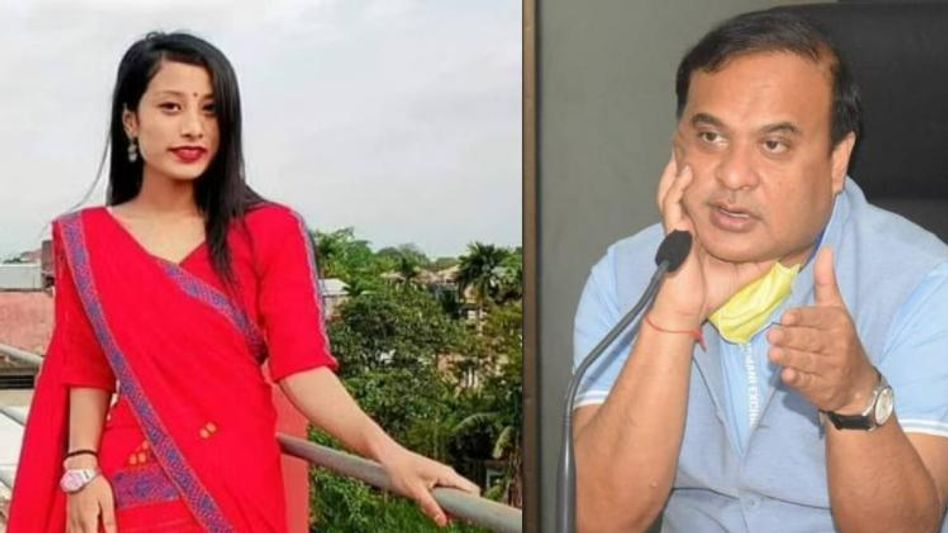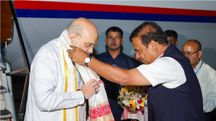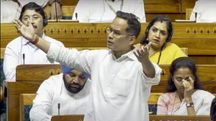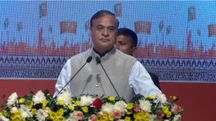Bail or jail? Who decides? Courts or Himanta Biswa Sarma?
The police or the chief minister has no role in the acceptance of a bail application of an accused. It is the discretion of the court. Yet, a perception has been created that only a chief minister or a political stalwart can ensure freedom or captivity of a citizen.
 Barshashree Buragohain(left) and Himanta Biswa Sarma(right)
Barshashree Buragohain(left) and Himanta Biswa Sarma(right)On July 22, Barshashree Buragohain, an 18-year-old college student in Assam, walked out of Jorhat district jail after more than two months of incarceration. The undergraduate student had been arrested under the stringent Unlawful Activities (Prevention) Act, 1967, for writing a poem, which allegedly professed support for the banned outfit United Liberation Front of Assam (ULFA). She even wrote something seditious—aakou ebar rashtradroh karim (I’ll commit treason once more).
Though it could be interpreted as an overreaction, the police were well within their rights to arrest the girl as an FIR was registered. “When someone publicly profess support for a banned organisation and declares the intent of waging war against the Indian state, we are legally bound to prosecute that person. Let the law take its own course,” said GP Singh, Special DG of Assam Police.
Till now, a purported crime was committed, and police reacted as per the legal measures available. Of course, the proportionality of the action taken against an 18-year-old girl, who expressed her thoughts through a poem on social media, is open to social and political debate. But the final authority, according to Indian Constitution, to determine whether a crime was committed or not rests with the judiciary.
But surprisingly, that role seems to have been usurped by the executive, which includes the political establishment and police force. Recently Chief Justice of India blamed the media for running extra-judicial trial and pressurizing judiciary. That assessment may or may not be true but the political narrative that followed Barshashree’s arrest and subsequent release on bail should alarm the honourable judges more.
There has been a deliberate attempt by the executive to create a perception that its power and influence expand beyond the scope of judiciary. Take this statement by the Assam Police chief Bhaskar Jyoti Mahanta, known as a fine gentleman, compassionate human being and a scholar on Assamese language and culture. When asked about Barshashree’s arrest, he quipped: “Young girl, you don’t need to go to ULFA. Stay in jail.”
It may have been a slip of tongue, but he made no effort to correct it. Legally, whether a person stays in jail or out of it is determined by the court. The police role is restricted to arrest, investigation and filing charge sheet. In Barshashree’s case, the charge sheet has not been filed yet. But still the top cop’s statement hinted that Assam police deliberately kept the girl in jail to prevent her from joining the ULFA. Based on the poem, Mahanta assumed that she was all set to join the banned outfit.
But more dangerously, the statement, without perhaps intending to do so, indicated that the judiciary had become an institution just to grant the executive their wishes. That’s certainly not the fact but one can’t be blamed for being misled into believing that the executive can get away with prosecuting any citizen without facing the legal scrutiny of courts.
Mahanta’s statement cannot be ignored as an aberration. Chief Minister Himanta Biswa Sarma went a step ahead and said that he, in fact, protected Barshashree from death by keeping her in jail. He reminded how ULFA chief Paresh Baruah had given death sentence to 42 cadres earlier and claimed that by keeping her in jail and stopping her from joining the ULFA, he had saved her life. This is the most novel way of protecting the life of a citizen.
Sarma may have had all the good intent for Barshashree’s future, but under no provision of Indian constitution, he or his government can keep a person in jail, even if to protect that person from any harm. Was he trying to indicate that the courts take notes from him? And more importantly, that cannot be the ground for arresting a person or throwing him or her to jail. The court certainly found ground to send her to judicial custody, it did it by following the prescribed laws. But the chief minister perhaps wants us to believe that he can keep anyone in jail.
Finally, when the Gauhati High Court granted her bail, Barshashree’s parents thanked Sarma for her release. The police or the chief minister has no role in the acceptance of a bail application of an accused. It is the discretion of the court. Yet, a perception has been created that only a chief minister or a political stalwart can ensure freedom or captivity of a citizen.
This perception has been fuelled by two factors—the legally incorrect statements deliberately made by the political class and the courts not taking cognizance of these statements. If media is conducting kangaroo courts, the executive is delivering verdict even before the trial. If not stopped, this trend will blur the categorical division of power among three pillars of Indian democracy—executive, legislature, and judiciary—which is a big threat to individual liberty.
Copyright©2025 Living Media India Limited. For reprint rights: Syndications Today









